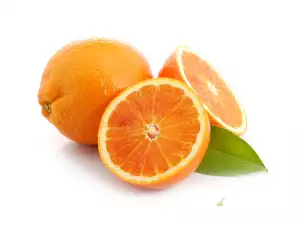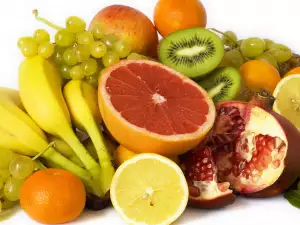Bioflavonoids are a group of antioxidants that possess a number of health benefits. They are pigments found in plants; their presence is linked with the red, yellow or blue coloration of fruits and plants. From a biological standpoint, they play a 2-part role - defense against microbes and insects and attracting attention with their beautiful color.
Benefits of Bioflavonoids
Research regarding the properties of bioflavonoids has only begun in recent years. Initially, they were discovered as vitamin supporters, which contributed to their benefits, something that holds especially true for vitamin C.
It is believed that bioflavonoids have a very important role when it comes to preventing diabetes.
Some of them protect against bad cholesterol, while others affect cataracts linked to diabetes. The main role of bioflavonoids is to protect against harmful free radicals.
It's been proven that these plant pigments have a much stronger antioxidant action in comparison to familiar antioxidants such as vitamin E and C. They help cleanse the body of toxins in the long-term.
Bioflavonoids protect against thrombosis, ulcers, improve blood vessel elasticity, a sort of prophylactic against stroke.
This type of antioxidants is exceptionally healthy for cardiovascular system health because they protect against plaque buildup in the blood vessels and lower cholesterol.
Types of Bioflavonoids
Proanthocyanidins - contained in fruits such as blueberries and strawberries. Besides having an antioxidant action and fighting free radicals, they also raise vitamin C levels. Proanthocyanidins strengthen blood vessels and decrease collagen degradation. Substances from this type of bioflavonoids are used in dentistry to protect against tartar.
Epicatechin - found primarily in cocoa and according to some experts is crucial for heart health. Besides the usual functions of bioflavonoids, it not only fights free radicals but carries out an entire process of breaking them down and removing them from the body.
Quercetin - present in all sources of bioflavonoids but especially in citrus fruits. Quercetin is considered the most active out of all of them. It has excellent anti-inflammatory, antidiabetic actions, some even attribute anticarcinogenic properties to it.
Quercetin is a very important regulator of histamine in the body, which is of prime importance for regulating immune system function. Quercetin stops allergies at the very beginning of their development, making it a crucially important substance in seasonal anti-allergy treatments.
Sources of Bioflavonoids
The richest source of bioflavonoids are citrus fruits. They are rich in the bioflavonoids rutin, quercetin and others, which enhance the absorption of vitamin C abundant in the citruses.
Citruses are loaded with dietary fiber, which regulates blood sugar and lowers cholesterol. They are rich in potassium and at the same time are low in sodium, making them good for lowering blood pressure.
Wine lovers should also know that it too is on the list of rich sources of bioflavonoids. And cocoa as well - it is primarily abundant in epicatechin, which is known to beneficially affect the circulatory system.
All tiny fruits, such as strawberries, blueberries, blackcurrants, raspberries and other similar ones contain a number of bioflavonoids, even though they are richest in proanthocyanidins and quercetin. These fruits are excellent against infections. Walnuts too can be added to the list.

Among vegetables, kale, broccoli and yellow onions are extremely rich in bioflavonoids. Soya and soya products possess bioflavonoids, the greatest amounts being in tofu and soya milk.
A real perk of bioflavonoids is that they are easily absorbed by the body, as well as easily removed because they have a water soluble structure. This makes taking them not only exceptionally healthy but also completely harmless. All that's needed is to find fresh sources of these valuable substances.
Deficiency of Bioflavonoids
From everything listed above, it's clear that bioflavonoids are exceptionally important for health and the immune system.
A deficiency of them can lead to a range of unpleasant problems - but the most common symptoms are capillary instability, expressed in red or blue spots on the skin, gum bleeding, inflammation and pain in the ears.
All of these symptoms resemble those of vitamin C deficiency, whose absorption is facilitated by bioflavonoids.
















